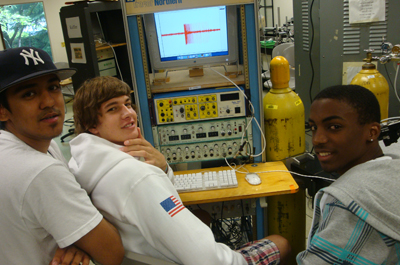Collaborations with Washington MESA
At Summer Study 2011, DO-IT and Mathematics Engineering Science Achievement (MESA) staff tested some of the activities in MESA's wind energy curriculum with students who have many types of disabilities. Students offered suggestions for making the activities more accessible. The activity was highly rated. It gave students the opportunity to provide their expertise and leadership, and allowed MESA to gain knowledge about accommodations and universal design of their projects.

Subsequent grant funding provided by the Boeing Company in 2012 allows DO-IT to strengthen its partnership with MESA, in a project where DO-IT staff collaborate with MESA on curriculum.
DO-IT technical staff will review MESA's current curriculum and will make recommendations to ensure that online content is presented in an accessible format that can be accessed by people with disabilities, including those who are blind.
DO-IT staff will also develop guidelines to help teachers make MESA materials accessible to students with specific types of disabilities. They will include examples of accommodations for activities as well as principles of universal design that can be proactively applied to make curriculum and activities more accessible to all students.
Project staff will provide professional development to teachers, including MESA teachers, regarding how STEM can be made accessible to students with disabilities through accommodations and universal design. They will share relevant content in an online Knowledge Base hosted by the DO-IT Center.
The collaboration will increase the participation of people with disabilities in STEM fields and improve these fields with the talents and perspectives of this group. The comprehensive, integrated, and collaborative efforts will result in improved postsecondary education and employment outcomes for people with disabilities. As STEM educators employ more inclusive practices and as students with disabilities who benefit from project activities enter the work force and strengthen the labor pool in STEM careers, the return on the investment will be large.